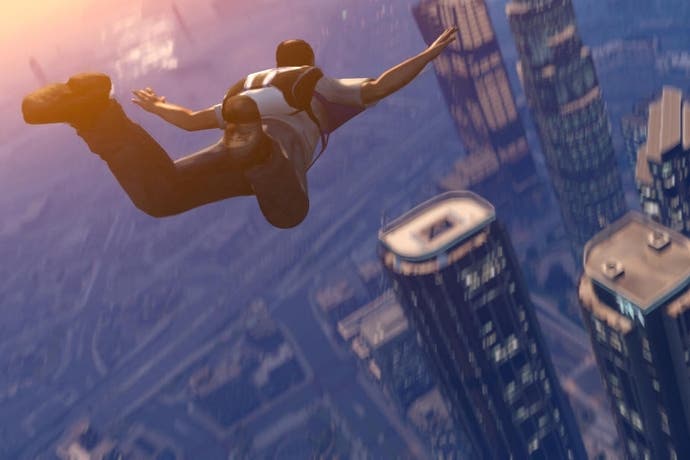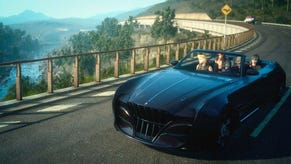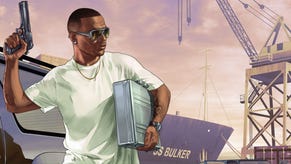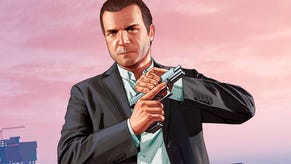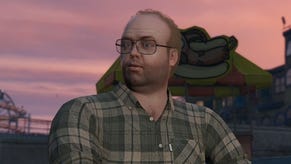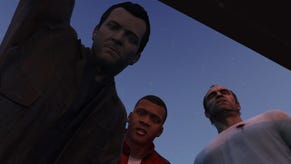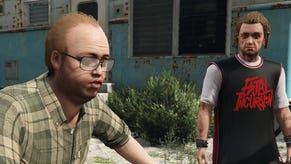Games of 2013: Grand Theft Auto 5
Secret Santos.
I live half a world away from the Santa Monica pier, but over the years I have been a frequent visitor to its planks, so ghosted by the insistent sun, so buffed and smoothed by the sandy wind. It's a handsome pier, narrow enough that you don't mistake it for a road (even though the occasional police car creeps along its back), but long enough to carry you a good distance out to sea. At its far end the fishermen bob in a row, their taut lines stretching off forever into the easygoing Pacific.
The Santa Monica pier is an honest jetty leading away from the dishonest plastic and bronze of the beach, where the bodybuilders flex and maintain, and the girls jog along behind their tottering poodles. But it's also a jetty leading away from Los Angeles, with its heat and murder, its sky-bothering monuments to money and power, the humanity-thinning strip clubs and strip malls and that relentless ambition that hazes in the air during daytime, only retreating at night. Whenever I'm in town I go to the Santa Monica pier, to get away from the city, to get away from the job at hand.
Not all of Los Angeles and its surrounding area can be found within Grand Theft Auto 5's Los Santos, but much of the geography and architecture is present and correct even if the names have been mangled and perverted (Beverley Hills becomes Rockford Hills, Skid Row becomes Mission Row, Hollywood is Vinewood and so on). Los Santos is a dreamlike approximation of Los Angeles, which is to say that it trims away its defects (that wearisome sprawl, for one thing) leaving just the highlights and the monuments.
The Santa Monica Pier is one such highlight and, while it's known in the game as the Del Perro pier, it's nevertheless an exact replica, complete with the anachronistic arcade midway along the spine, and the cogs and spires of a small fairground arising from its neck.
I spent much of my time here in the game, too, peering over the fishermen's shoulders, wondering what lay over the horizon. I wandered around the sodden stilts upon which the pier stands. I rode the big wheel as the sun set. I paddled. These moments were reflective and, like so much of the game, quietly miraculous (the adjusting light, the lazy bustle, those waves). I came here to get away from the city. I came here to flee the job at hand.
No video game could make a billion dollars in 72 hours by itself. To inspire that amount of interest and immigration into its world, it would have to be many video games all at once. So it is with Grand Theft Auto 5, which is closer to a city than a game, with all of the different entry points and necessary footholds for different kinds of visitors to latch on to.
It's there in the three protagonists - the disillusioned middle-aged father, the out-of-town social outcast and the competent young buck, each one offering a different potential point of empathy for your own story to connect with. It's there in the meticulously compiled soundtrack, with which you can set the mood of your journey to anything from saccharine pop to weed-haze hip hop according to taste, age or, perhaps, class. It's there in the script, which ridicules hipsters, gangsters, gamers, actors, cops, paparazzi and scores of others with scattergun imprecision: if you have a bugbear, Grand Theft Auto 5 has a quip to validate your intolerance and, perhaps, make fun of it.
It's there in the huge range of activities on offer: towing illegally parked cars to the impound, playing fetch with your dog, running over joggers, shooting policemen, playing tennis, riding cable cars, knifing sharks, investing in real estate, delivering hikers to cannibalistic mountain cults, stealing yachts, and even staring out to sea from the pier at night. Whoever you are and whatever it is that you like to do, the city of Grand Theft Auto 5 has a place for you. No video game could make a billion dollars in 72 hours by itself. But a video game that encompasses many different video game lives? That might do it.
The question that lingers over such an approach - and make no mistake, it's an artistic query rather than a commercial one; Rockstar's accountants lose no sleep over this - is where such a game's identity is to be truly found.
Perhaps it's in the satire, because there is no city quite so perfect as Los Angeles for Rockstar's lampooning ambition. "Imagine a city full of people ruthlessly pursuing wealth, fame and self-improvement, at any cost," invites the game's manual, "where everyone you met was either a celebrity, trying to be a celebrity, or used to be a celebrity..." Los Angeles is the city where America's excesses are most obviously on show. It doesn't have New York's more sombre, migrant-worker spirit, or Miami's apathetic wealth (a city that, behind the lights, is slackened by pool fatigue). No, here in Los Santos, America's madness and ambition collide in a cocaine frenzy; the place is ripe for satire - even by the Scots.
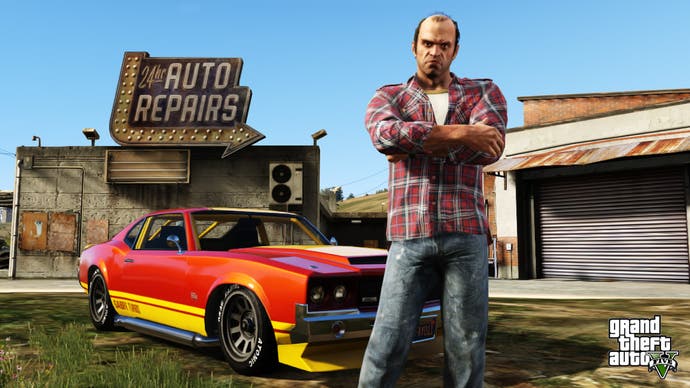
But Grand Theft Auto 5's satire fails or, at very least, is weakened by its precise lack of focus. In trying to be all things to all men (and maybe a few things to a few women, as an afterthought), the target of all this ridicule is never quite clear. Is all of western life ridiculous? The fags and drags; the ones trying to find themselves in therapy and the ones trying to lose themselves in witness protection; the mobsters and their oh-so-similar counterparts in the FBI; the rich and the poor, the privileged and the underprivileged? Grand Theft Auto 5 neither punches specifically up nor specifically down. It simply punches outwards: up, down, Left, Right, anywhere really in the hope that something might hit someone or other.
If the game's true heart isn't to be found in the satire then perhaps it's in the storyline and accompanying missions. Here, the game's generosity of appeal is much more limited. There are no women in lead roles, which is more a missed opportunity than an offence - the idea that a character like David Simon's "Snoop" Pearson could not fit this sort of story is ludicrous. Carolyn Petit at GameSpot defensibly described the game as "profoundly misogynistic". In other words, not only does it not feature any women in lead or meaningful roles, it is in fact anti-women, in both its script and satire.
Aside from these questions, the game's three male protagonists are all of a criminal persuasion and their motivations are generally similar in tone: to get rich, get even or get somewhere. It's a family unit, of sorts: organisational Michael is the mother figure, unpredictable Trevor the violent, tempestuous father and deferential Franklin is the child pulled in two directions by the older figures, and yet who also reveals himself to be the most responsible of the three. But there's little genuine fondness between them. Theirs is a triangle of convenience; they need one another to obtain the things that they want.
This truth is reflected in the game's central heist-like missions, which cast each of the characters in a different pivotal role: the planner, the executor and the getaway driver. These missions are the closest Grand Theft Auto 5 has to a spine. They offer some of the most elaborate and involved scripted missions in the series' history and, yet, there is still a vacuity in their aftermath. Perhaps the stakes are too low (there's always a mission restart if something goes wrong) or, more likely, the potential winnings are too ordinary. Watching characters make money for money's sake grows tiresome in fiction (and this bland outcome is, in fact, one of the entire game's potential endings). In all but a few notable exceptions, there is not enough subtext to make the robberies truly interesting - there is, in other words, no heart to be found here.
Which leads us back where we began: the city. Los Santos is the heart of Grand Theft Auto 5 because it is here, on the shrapnel-strewn streets, under the dense forest foliage and in the thin mountain air that the wonder of this game can be most plainly seen, its clockwork life appreciated. It's a city of unobtrusive miracles: the way that the traffic moves and accommodates your surprise intrusions and swerving; the way that the sun wheels in the sky, casting light and shadow that alters the character of the countryside below in mesmerising ways; the fuzzy car light circles that wobble and tilt in the distance when you stand on a hillside outside of the city and gaze in; the sniping hawks, the beach campfires, the way that the sea heaves and froths. Grand Theft Auto 5 may not be everyone's game of the year, but Los Santos is perhaps the greatest set that the video game medium has ever seen, so lovingly cribbed from reality, and then so skilfully bettered.

The wonderful thing about Los Santos and the various freedoms that Rockstar's diligent coders have given us within is the chance to live out fantasies too dangerous, illicit, incriminating or unreachable in real life. Standing at the end of the Del Perro pier, taking a break from the city's heat and murder, I stood on the railing like a suicidal jumper and, while the fishermen gawped, flailed through the air and into the water.
A deep breath, then I jacked a nearby jetski and, without looking back, tore off towards the horizon. The radio (jetskis have radios now?) was set to Non-Stop Pop FM and Robyn's With Every Heartbeat thumped through its tinny speaker, joined by an ecstatic chorus of gulls.
The jetski thwumped up and down on the water, belly flopping over the shifting hills and watery valleys. It remains the most joyous video game moment of my year: the smile was honest and lasted for ages. I expected the sirens to wail at any moment - in previous games in the series, once you ventured too far from the map, the local law enforcement came after you in full force to put a quick end to your errant voyage.
But no sirens came. Mile after mile I rode, till the pier was a fuzzy light on the horizon and Robyn's voice ran out. I switched off the engine and, with a contented sigh, plunged into the water, and dove down and down as far as I could swim. As the screen throbbed and, at last, the lights went out, Grand Theft Auto 5 had given me everything I wanted from it in that moment, something that, in all likelihood, nobody else had even asked for.
No video game could make a billion dollars in 72 hours by itself. But a video game that encompasses many different video game lives and even deaths? That might do it. That might do it.
